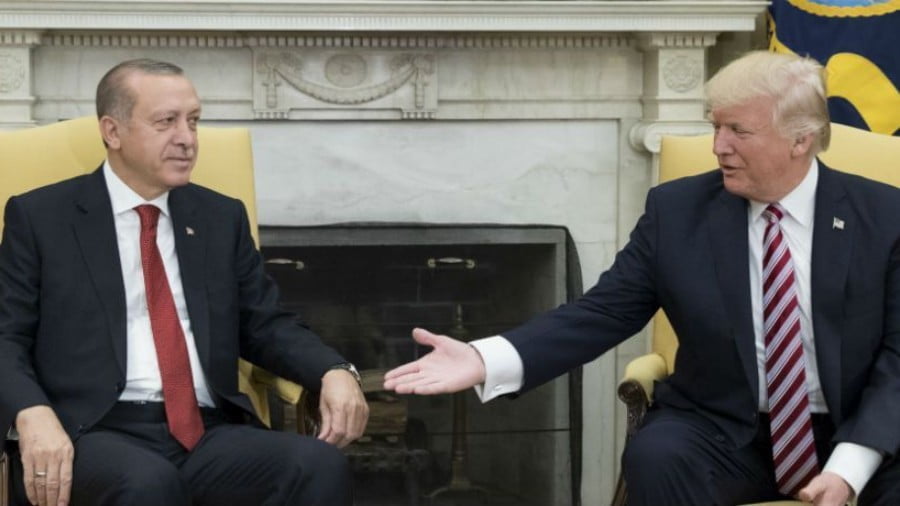Is the US Secretly Behind Thousands of SDF Militants Heading Towards Afrin to Fight Turkey?
I’d like to begin with a disclaimer. This piece is one part thought exercise and one part speculative. It it is no way to be understood as an assertion of any single or group of claims, but rather it is a means of speculating on how recent and current events relate to the grand US strategy for Turkey and Syria.
The facts on the ground state that the US has lost control of its SDF militia, a group compromised mostly of Kurdish YPG militants in conjunction with some peripheral Takfiri groups, with the more recent addition of some freed and allegedly “rehabilitated” Daesh prisoners. While the US has spun itself into rhetorical circles trying to convince Turkey that the SDF is somehow different than the YPG which comprises most of its ranks and all of its leaders, Turkey has been vindicated insofar as Kurdish militants calling themselves SDF have decided en masse to vacate the US occupied territories east of the Euphrates in order to travel west to Afrin where they plan to link up with their YPG militant comrades in order to fight the Turkish Army and Turkey’s proxy fighters.
The US has been forced into what amounts to a mea culpa insofar as the Pentagon now admits that the SDF’s ground missions (which these days mainly means guarding the oil fields) have been “operationally paused”. While the US has lost the ability to do anything substantial with a partly depleted SDF militia, the US Air Force will continue to patrol the area under the guise of fighting Daesh, a claim which has been rejected by both Russia and Syria as not corresponding to the facts on the ground.
Here too, conventional wisdom would say that the US has backed itself into a corner by alienating its former Turkish ally through putting all its eggs in the SDF basket, only to find that the Kurdish fighters of the SDF have their own ambitions which don’t necessarily include making Syria’s sovereign oil fields safe for American energy companies. Ultimately the YPG/PYD goal in northern Syria is to carve out a statelet with whose ever help they can. Their current preferred strategy is to try and force a conflict between Turkey and Syria, from which they somewhat extravagantly hope to reap the benefits.
This is the objective narrative – and now for the speculative narrative. I have little doubt that when the SDF was formed in late 2015, its US paymasters wanted a proxy force that was thought to be more consistent than various Takfiri groups operating in other parts of the country. One has to remember that in 2015, Barack Obama’s America was on decent terms with Turkey. This was before the failed Turkish coup of 2016 and long before Donald Trump with his generally pro-Kurdish and anti-Takfiri rhetoric was taken seriously as a Presidential candidate. To put a twist on an old expression, time flies when you’re engaged in illegal warfare.
America’s failure to adamantly deny involvement in the failed Turkish coup of 2016, combined with a complete failure to assert a counter-narrative to President Erdogan’s FETO (Gulanist)-US theory, has made it clear that the US either had a hand in the coup or were at least not too disturbed by the fact it happened. If for example such a coup that the US did not approve of were to take place in another NATO state, whether Italy, Greece or Spain, one could imagine the US going into overdrive to try and revert the situation. If the word “Gladio” comes to mind, your thought process is clearly headed in the correct direction.
America’s connections with the figure of Fethullah Gulen and his terror group FETO are well known. Gulen resides as a free man in the US in spite of constant Turkish demands for his extradition on criminal charges relating to terrorism. It is also known that Turkish authorities have arrested several employees of the United States who work in Washington’s consular offices in Turkey. Again, if Britain accused members of the IRA of working at the US Embassy in London or if Spain accused members of ETA working at the US Embassy in Madrid, one could imagine the kind of geopolitical hell that would break lose. Instead, the US has if anything, tacitly taken the side of its alleged Gulenist employees in a silence that speaks far louder than words.
If all of this wasn’t bad enough in terms of straining Turkey-US relations, the fact that the US continues to back the SDF as an organisation even while admitting that they are now following their own orders insofar as they’re taking up arms against Turkey, is an indication of just how little concern the US has for what Turkey views as a major security threat.
Connecting these various dots, one has to wonder if the US isn’t purposefully orchestrating these seemingly chaotic movements of the SDF in order to further provoke and antagonise Turkey. Since the US is clealry at odds with Erdogan and his government on issues ranging from Turkey’s attempts to purchase Russian S-400 weapons to the US alliance with what Turkey considers a terror group (the YPG/PKK), one could see how the US might want to test the waters and see how far they can push Turkey before Ankara pushes back. Already, the US has expressed its dissatisfaction with Turkey’s Operation Olive Branch which theratens to expland further east into US occupied territory. What better way to attempt to delay or stop these Turkish ambitions than to allow more Kurdish militants and the most radicalised ones at that, to flood into Afrin?
Clearly, the US is not about to do to Turkey what it did to Libya in 2011 or Iraq in 2003, owing to Turkey’s strength and its position in NATO, but clearly the US would like to agitate internal factions in Turkey ranging from the PKK, to the FETO, to Takfiri sleepers, to other anti-government groups in an attempt to bring about a Turkish leadership that is more amiable to America’s strategy.
With all this in mind, one must question whether the SDF going to Afrin isn’t a matter of design on the part of a US government and deep state that is coyly hiding behind the excuse that “we can’t control our proxies”, which in this context is the blasé diplomatic equivalent of ‘shit happens’ . When terrorists in East Ghouta aligned with the west commit atrocities against the civilians of Damascus and both Syria and Russia tell the US and its allies to keep them in line, the US says nothing – again a tacit admission that they have leverage over these terrorists but would rather not use it for something even remotely positive (like obeying a UN Security Resolution). But when it comes to the SDF, the US which rarely if ever admits mistakes, is more or less saying “oh well, some of our proxies are following their own orders rather than ours, but we still like them and everything is pretty much fine”. This almost sounds too relaxed a response given the severity of the situation. This is especially true after Rex Tillerson’s recent “mission damage control” to Ankara where he again tried to tell Turkey not to worry too much about the Kurds acting as US proxies. These are now the same proxies the US claims it can’t fully control. Turkey didn’t buy it then and they are certainly not buying it now. Clearly, if Turkey wanted to claim that the US bears responsibility for the actions of its wayward SDF proxies, Ankara would have a strong case going by the precedent the US set by claiming that Russia and Iran bear collective responsibility for actions of Syrian regulars and volunteers that Washington disagrees with.
Something just doesn’t add up. Of course, the US could simply be coming face to face with its own failures, realising that it’s Takfiri proxies near Damascus are losing ground rapidly to the Syrian Arab Army and its Russian ally and that its Kurdish proxies listen to no one, whether Damascus, Washington or anyone else. The other theory is that the US knows exactly what it is doing and having failed to achieve its primary regime change objective in Damascus, it is turning to a country it knows far better than the Syrian Arab Republic, the Republic of Turkey.
There is no altruism in geopolitics. Ecuador has housed Julian Assange to increase the prestige of an otherwise poor South American country and to trust its charismatic former President Rafael Correa onto a wider global stage. This worked and now Correa’s less glamorous though still left-wing successor simply wants the Assange issue to go away. Likewise, the US is housing Fethullah Gulen not because the American people enjoy the man’s company. Clearly, the US wants leverage against Turkey and perhaps they want something more, perhaps they want regime change. While many in Syria, Greece, Armenia and elsewhere also want regime change in Turkey, the kind of regime change the US wants is a very different kind of regime change. The US is almost certainly salivating at the prospect of replacing a fiercely independent and outspoken Erdogan with a pliable Gulenist who owes his power to the United States. Washington certainly is not looking to put a Greek Patriarch or an Armenian activist in power, much though many alt-media opponents of Erdogan might wish otherwise.
By Adam Garrie
Source: Eurasia Future







